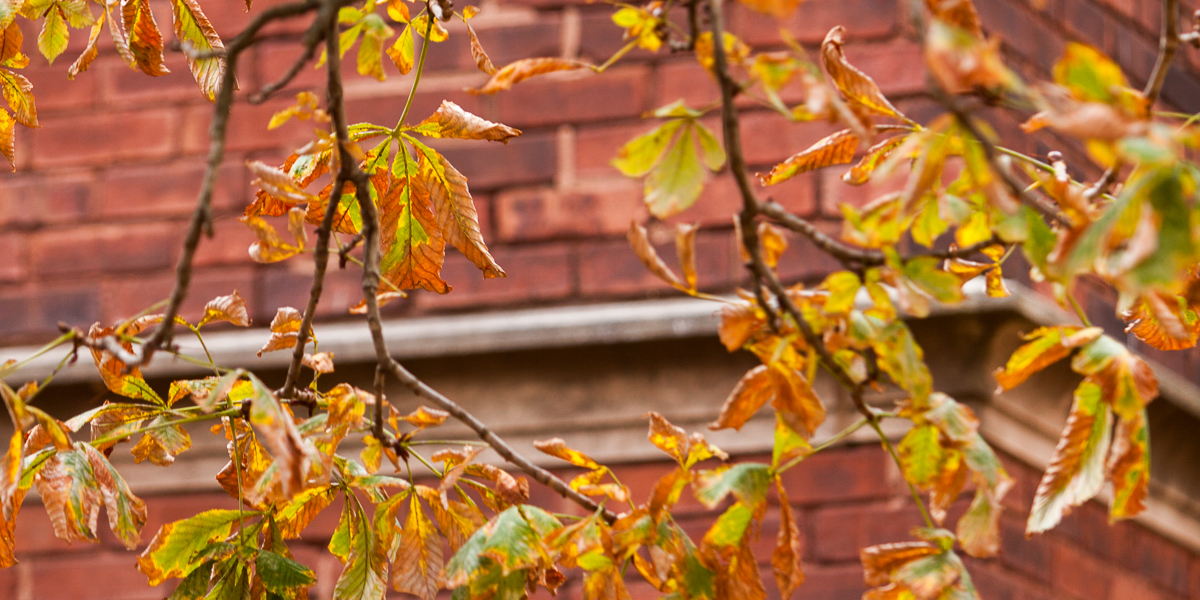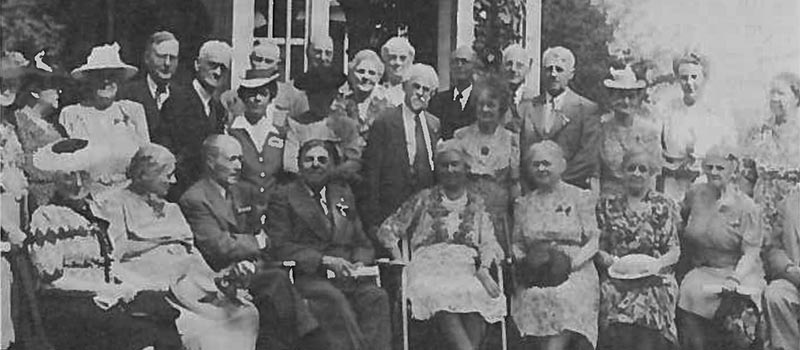

Venture Boldly



by Kieran McCarthy '00
Earnest Elmo Calkins, Class of 1881, had a bone to pick with Knox College’s founders. As much as George Washington Gale and his followers may have done to found Knox, Galesburg and the surrounding community, none among them had the historical instinct to document their experiences for the ages. The early records they left were so poor that according to Calkins, the only thing we know about them now, “is that they’re dead.” Having written They Broke the Prairie, a history of Knox and Galesburg, in 1937 for the centennial of their joint founding, Calkins had a keen sense of the frustration caused for archivists and historians by such vague and unsatisfactory records.
With this in mind, on the 11th of June, 1944, Calkins -- pioneer of modern advertising, amateur historian and loyal son of Knox -- addressed a gathering of Knox alumni assembled in Oneida, Illinois, on the front lawn of Knox trustee Janet Greig Post '94. These 25 men and women, all of whom were from the Class of 1894 or earlier, were the founding members of the Knox College Fifty Year Club, the first organization specifically dedicated to the preservation of Knox’s own history.
The Fifty Year Club, according to Calkins, was to be open to all Knox alumni 50 years or more removed from the College. Its two guiding principles were:
"To unite in one body those who share common memories of a certain period of Knox history quite different from that of recent graduates ..."
"To preserve a record of all Knox people, which is in its essence the history of the College. The alumni are the end products of the College, its reason for existence. What they are, and what they have done is the measure of the College, its contribution to culture and civilization of the country ..."
One of the driving forces behind the new organization was Edward C. Caldwell '86, a New York publishing magnate and president of the McGraw-Hill corporation. Together, he and Calkins tried to contact the 650 living alumni who had graduated between the years 1860 and 1894. Of those, 364 were reached, and a little less than half ultimately responded. To aid their search, they used information compiled by Max Goodsill '12, author of the Knox’s 1937 Centennial alumni directory. Goodsill, a journalist, corporate public relations executive and former Knox trustee, had been accumulating data for years, and was eager to help Caldwell and Calkins with their search. In 1962, Goodsill himself was inducted into the club and a year later became the club's director of activities, a position he held until 1982.
Throughout its 55-year history, the Fifty Year Club has dedicated itself to keeping Knox’' past alive in Knox's present. In 1972, for instance, George Washington Gale IV, great-grandson of Knox's founder, spoke at a Club luncheon to tell the tale of how the College got its name. According to his grandfather, the original founders argued profusely over what to call their new school. The names of several famous people were bandied about, but two of the most popular were John Knox, the noted Scottish Presbyterian, and Henry Knox, George Washington’s Secretary of War. Ultimately, he said, the Knox name won out, some of its supporters thinking they had voted for John and others that they had voted for Henry.
"No person has done more for Knox College than Max Goodsill, and I don’t imagine anyone ever will." By the same token, few have done more for Lombard College’s legacy than the author of those words, Gail Youngren, Lombard Class of '27.
In 1970, Goodsill enlisted Youngren's help to organize reunions of Lombard graduates. When asked if she could create a gathering of at least 75 Lombard alumni, Youngren replied, "If I can’t get at least twice that many, I’ll consider myself a failure."
Since that time, no one has devoted more time, energy or spirit to the Fifty Year Club. After a stint as club president from 1979 to 1982, Youngren became the club's director on Goodsill's retirement, a position which she held into her nineties. In 1991, she arranged for a monument to be placed on the former site of her alma mater as a way to commemorate Lombard College, which operated in Galesburg from 1851 until the Great Depression forced its closure in 1930. Like Goodsill, her work was done on a volunteer basis. In nearly 30 years of work for both Lombard and Knox, she never once accepted a penny for her services.
Since its founding, the Fifty Year Club has grown considerably, from 200 inaugural members to more than 2,000 today. The Club's current president is Jack Larson '44.
How does the Fifty Year Club let alumni know that Knox still cares? For one, it sends every member a personalized birthday greeting card. For many older members of the community, birthdays are not only a time for celebration, but also a time of great achievement. "Older people need special attention," says Youngren, "The cards are one of the things members like. Some put them up on their refrigerators."
In order to truly understand the impact the Fifty Year Club has on its members, one only has to read the Club’s tri-annual newsletter, the Fifty Year Club Bulletin. Knox and Lombard alums never miss an opportunity to reminisce with their former friends and classmates, and nowhere is this more evident than in the Bulletin. From war stories about introductory biology lectures to real war stories about World War II, Fifty Year Club members have a lot to say to each other, and, as the Bulletin shows, they rarely refrain from saying it.
Some use the Bulletin as an opportunity to brag about their continued good health, and others use it to let former friends to know how to reach them. The Bulletin is also useful in keeping half-century alumni up to speed on current goings-on at Knox. It contains information on how the optional club dues ($10) are being put to good use, including personal information on Fifty Year Club scholarship winners. (Said Jon Viser, '02, a sophomore from Memphis, Tennessee, and recipient of the Garnett Babbitt Martin Fifty Year Club Scholarship, "It's very important. If I hadn’t received the scholarship, I’m not sure I would’ve been able to come to Knox.")
Megan Clayton, current Fifty Year Club coordinator, can’t help but notice the special connections people make in the FYC. "Knox has strong ties with their alums," said Clayton, adding, "It's great to see that these ties can last for 50 years."
Under the guidance of the board of officers, she holds the responsibility of publishing the Bulletin and organizing club activities. As she notes, "The upcoming classes are always becoming more active, more involved." The increased activities have made Megan's life especially busy. According to her estimates, around three-quarters of the Club's 2,000-plus members respond either to the cards, bulletins, or letters sent out by the FYC.
Every year, the Club holds three official gatherings: Homecoming, Founders Day and Commencement. At each event the Fifty Year Club holds sizable gatherings for classes whose numbers have diminished over time. In addition, the Club hosts coffee hours, luncheons and guest speakers specially geared toward older alumni. Recent lecturers have included Athletic Director Harley Knosher, historian Douglas Wilson, and (former) Knox President, Dr. Richard Millman. Because the Fifty Year Club is also one of the few remaining campus organizations to celebrate Founders Day, it often finds itself the source of special attention come February 15th.
Commencement, however, has always been the most important and popular activity of the FYC. Every year, the Club inducts its new members, who are also invited to process with the new baccalaureates at graduation (photo below). During this joint procession, new members and new graduates alike see what it means to be a part of the Knox family, and the vision of founding members Calkins and Caldwell is realized.
So, a little more than a half-century after its creation, the FYC continues to impact the lives of Knox students two score and ten after their departure from the College. As Calkins and Caldwell had hoped, the Club has continued with sufficient momentum to survive into the next millennium, spurred on by what Calkins described as, "the sheer value and interest in its purpose." But this comes as no surprise to the members themselves, who have long known how the Fifty Year Club impacts their lives. "The Fifty Year Club is a fantastic organization," says Mary Immenhausen ’45. "The only ones who lose out are those who choose not to participate."
Much has changed in the Fifty Year Club since that day 55 years ago, but the dedication to Knox history and Knox alumni remains the same. Since that time, the stories and tales of Knox lore have changed, but the value of the Fifty Year Club has remained constant. From birthday cards to informative bulletins, the Fifty Year Club continues to bring camaraderie and friendship to its members, all while recording for posterity the oft-forgotten stories of Knox past.
Originally published in the Knox Magazine.
16K+
Alumni in our network
The Knox community extends to all 50 states and all but one continent.